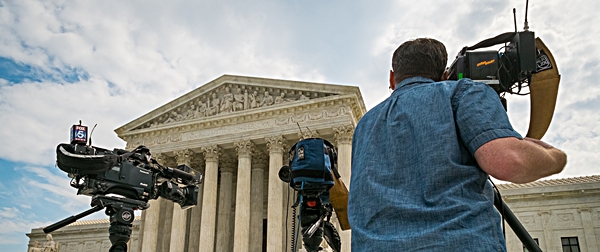Congressman: Aereo is ‘disturbing’

BEFORE THE BENCH: Aereo converts broadcast signals sent over the airwaves into content that can be streamed on the Internet. Videojournalists were there Tuesday outside of the U.S. Supreme Court as the court heard arguments.
By Josh Peterson | Watchdog.org
WASHINGTON —A conference this week on intellectual property would have been remiss if it failed to mention Aereo, a technology startup under fire at the Supreme Court.
Aereo’s technology consists of an array of antennas that allow subscribers to stream content broadcast over the open airwaves onto the Internet. Broadcasters argue that Aereo is circumventing copyright laws since it does not pay royalties on the content it streams.
The company’s future rests in the hands of the Supreme Court, which heard oral arguments this week from the company. A ruling is expected sometime in June.
During a keynote speech at the 2014 IP Champions conference on Wednesday, hosted by the U.S. Chamer of Commerce’s Global Intellectual Property Center, Georgia Republican U.S. Rep. Doug Collins sided with broadcasters, highlighting the broader implications of the trial.
OPPOSED: Rep. Doug Collins says protecting copyrighted words is an “issue with those who want to resell without consent from the creator. That’s disturbing to me.”
The conference, held at the Chamber of Commerce’s headquarters in downtown Washington ,D.C., celebrated business innovators, advocates, public officials and law enforcement efforts to tackle copyright infringement across the globe.
“You see, the protecting of copyrighted works was (an) issue with those who want to resell without consent from the creator,” said Collins.
“That to me is disturbing,” said Collins, “and it should be disturbing to everyone of you in this room no matter where you come from because if it is OK to take what I produce with my mind or what I produce with my work or my labor, and to take that and then to be able to resell it without my consent and without compensation, that should affect everyone in this room, but it’s not isolated.
“There’s a growing movement in this country to believe that if it’s out there everybody should be able to take part in it; it’s out there, everybody should be able to profit because if you thought of it and I can do it, I should be able to take it, and that is wrong,” he said.
Collins, according to the Center for Responsive Politics’ site OpenSecrets.org, has received $24,500 from the entertainment industry for the 2014 midterm election cycle.
But intellectual property is not limited to the entertainment industry, and neither are Collins financial supporters. He has received the support of the health, retail, manufacturing, defense aerospace and automotive industries, to name a few.
“Let me be clear, I believe that strong IP protections,” Collins said. “Intellectual property protections are not a hindrance to innovation, but they’re the very stimulus of the creative process.
“They give reason to go out there and dream the next dream, to write the next song, to develop the next medication, to develop the next widget or assembly line part, or whatever it may be,” he said.
“It is the very protections that the intellectual property rights have that cause you to want to be a part of the innovative process, not to take away from it,” he said.
Contact Josh Peterson at jpeterson@watchdog.org. Follow Josh on Twitter at @jdpeterson







